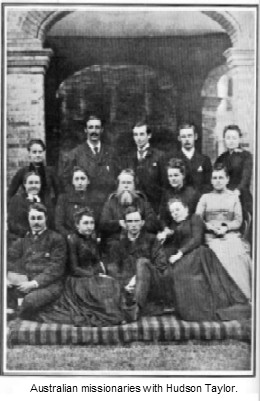It has been said that the blood of the martyrs is the seed of the church. Most Christians are familiar with the great British and American missionary martyrs of previous centuries, but perhaps less familiar are the martyrs of Australian missions. The first Australian missionaries to plant their blood in the seedbed of the mission field were two sisters, Topsy and Nellie Saunders, and another young lady, Annie Gordon.
It was 1895 and the anti-foreigner sentiment in China that would eventually break out in the Boxer Rebellion was gathering momentum. On 1 August of that year, the “Vegetarian” rebels carried out an attack on a mission station where the Saunders sisters and Miss Gordon were working (Welch, Missionaries, Murder and Diplomacy in Late 19th Century China: A Case Study, 16).
Nellie and Topsy were woken by three men with trident spears who tipped their beds over and dragged them out. Nellie was stabbed immediately and collapsed at the door. Topsy was marched outside and surrounded by several more men. “Walk! Walk!” they shouted at her, “tell us where you have hidden gold!” “We have no gold,” she replied: “there is money in the bedroom. Go and take it.” Angry, one of the braves dug a spear into her. (Gittings, link)
Eleven missionaries were martyred that day. Among them, the three Australian missionaries.
The next Australian martyrdom occurred three years later. Tensions continued to mount in China as the anti-foreigner sentiment, which would culminate in the Boxer Rebellion just two years later, continued to simmer. In November of 1898, missionary William Fleming, who had been saved through the ministry of the YMCA in Adelaide, was stabbed as he attempted to protect his native assistant, Pan Shoushan, from an attack. Both men died in the attack.
William Fleming was one of over 100 missionaries who were recruited from Australia to serve in Hudson Taylor’s China Inland Mission (Welch, Nellie, Topsy and Annie, 10). Fleming had the distinction of being the first martyr of the CIM. On hearing of Flemings death, Hudson Taylor wrote “How sad the tidings! Blessed for the martyrs but sad for us, for China, for their friends… Doubtless it means fuller blessing, but through deeper suffering” (link).
When the full force of the Boxer Rebellion hit, the violence was unrelenting. Before it was over, 188 missionaries had spilled their blood in cause of the gospel in China (Piggin, Spirit of a Nation, 73). Among them was David Barrett, a young Australian who had been in China for only three years when the rebellion began. On 30 August, as Barrett contemplated the reports of massacres all around him and the prospect of his own death which followed soon after, he wrote these words to a missionary friend:
Our blood may be as a true centre for the foundation of God’s kingdom, which will surely increase over this land. Extermination is but exaltation. God guide and bless us! “Fear not them which kill,” He says, “are ye not of much more value than many sparrows?” Peace, peace to you. We may meet in the glory in a few hours or days…. Let us be true till death. (link)
Indeed “extermination [was] but exaltation” for these heroes of the faith. They are our heritage. Their lives testify that they saw a “better country,” and gave up everything that would hold them back from living for eternity. May we follow in their steps.
About Jason Harris
9 Comments
Comments are closed.


It was interesting to find out that William Fleming was Australian. I just assumed he was British since he served with the China Inland Mission. His grave still exists. I actually saw it while touring in Panghai, a small village in Guizhou Province. There is a Chinese man buried next to him (probably the man he tried to save) as well as another, named Charles Chenery (not sure if his surname is spelled correctly…the headstone was hard to read).
You’d never know the graved existed except that I heard by word of mouth. They are actually located behind an old woman’s house. The graves are covered by pumpkin plants and weeds. It was a strong reminder of those who came to an isolated land to lay a foundation for Father.
Thank you so much for sharing that! I would love to visit there some day. It’s appropriate that he is buried in a garden. Truly the blood of the martyrs is bearing a great crop in China in our day!
William Fleming was a Scotsman from near Dundee. He was uneducated and the CIM tested his calling by asking him to find his own way to China. He had a difficult relationship with Frank Burden, an Englishman also recruited in Adelaide.
Yes, I was fascinated by these things during my research. Are you familiar with Fleming? I’d love to get more info on his life.
Jason, Contact me separately and I’ll give you what I have on Fleming. On the other hand, Frank Burden, an Englishman from Adelaide with significant local Baptist family links in Australia, was a far more significant person. His comments on Fleming suggest that the early reservations of the Australian CIM Committee were well-grounded.
Ian
Sounds good. If you can drop me some sort of contact details… my email is jason @ givemetruth.net.
Thanks.
I also visited his grave in Guizhou, back in 2005! It was a pretty moving experience. I didn’t know very much about him then, so this helps shed light on his past. Thanks for doing so much research, as it gives breath to the “great cloud of witnesses” passage.
Robert Banks is to speak about the Saunders Sisters at St Hilary’s Anglican Church, KEW (Australia) tomorrow -Sunday 4th May 2014.
Thanks for the heads up on that!